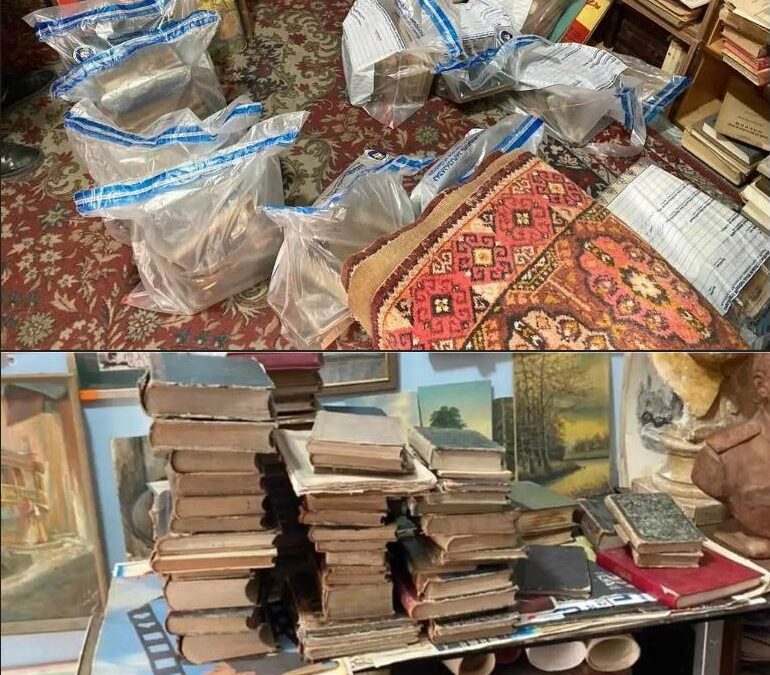Author: Andrzej Jakubowski
Committee: Art & Cultural Heritage Crimes Committee
Date: 03/05/2024
On 24 April 2024, a joint international operation, supported by Eurojust and Europol, against an organized group stealing rare books across Europe yielded its first results. Twenty-seven locations on the territories of Georgia and Latvia were searched; four suspects were arrested in Georgia (five other suspects had been arrested in Belgium Estonia, and Lithuania), and many old books were seized. This is the final of the notorious case affecting and engaging several European jurisdictions [1].
The thefts occurred in many countries of Europe: in the Czech Republic, France, Germany, Lithuania, Poland, Latvia, Estonia and Switzerland. As of 2022, over 170 rare books worth more than $2.6 million had disappeared from the Latvian National Library in Riga, the Vilnius University Library, the State Library in Berlin, the Bavarian State Library in Munich, the National Library in Munich, libraries in Helsinki, the National Library of France, university libraries in Paris, Lyon and Geneva, and in the Czech Republic. The Warsaw University Library was the most affected, with 78 items disappearing. Among the stolen books were works by world famous Russian authors, such as Alexander Pushkin, Ivan Krylov, Nikolai Gogol and Mikhail Lermontov [2].
Perpetrators, Georgian nationals, employed various means of operation to steal books. In some cases, they used false identities when ordering books from libraries. While one member of the group pretended to consult with library staff, thus diverting security attention, another replaced original rare books with copies that experts said were “of outstanding quality.”In other cases, the perpetrators simply broke into the library and stole books. Before committing the theft, they usually visited libraries and borrow books of the same type as those stolen [3].
The operation, undertaken by competent national, was supported by Eurojust and Europol. In fact, Eurojust (since November 2023) helped the authorities involved coordinate their investigations and define legal strategies. The agency held three coordination meetings to bring together all the judicial authorities involved to facilitate their judicial cooperation and prepare for joint actions. The agency also facilitated the setting and funding of a joint investigation team (JIT), under the name “Pushkin”, between France, Lithuania, Poland, Georgia and Switzerland in March 2024. Europol was also a participant in the JIT, while it launched the investigation after French authorities informed the agency of books that were missing from French libraries [4] [5].
During the “action day” at Eurojust, a coordination centre was set up simultaneously linking the various teams, including prosecutors’ offices, on the ground in the countries where operations were conducted. The coordination centre facilitated rapid cooperation and ensured that evidence and information collected was quickly exchanged between all national authorities involved [4].
This is one of the most important investigations concerning cross-border crimes against cultural heritage, undertaken recently with the support of Eurojust and Europol. It has demonstrated the importance of the cooperation between different authorities, particularly national and local prosecutors’ offices, to curb criminal practices within the EU and in its neighbourhood.
- [1]https://www.steppo-eulaw.com/2024/02/01/polands-accession-to-eppo-and-the-prosecution-of-crimes-against-cultural-heritage
- [2]https://www.theguardian.com/books/2024/apr/25/rare-library-book-thefts-europe-libraries
- [3]https://www.euronews.com/culture/2024/04/30/icymi-eu-police-arrest-georgians-suspected-of-stealing-25-million-worth-of-antique-books
- [4]https://www.eurojust.europa.eu/news/crackdown-criminal-network-stole-170-historical-books-worth-eur-25-million-across-europe
- [5]https://www.gov.pl/web/prokuratura-krajowa/udzial-polskiej-prokuratury-we-wspolnym-miedzynarodowym-zespole-sledczym-puszkin

